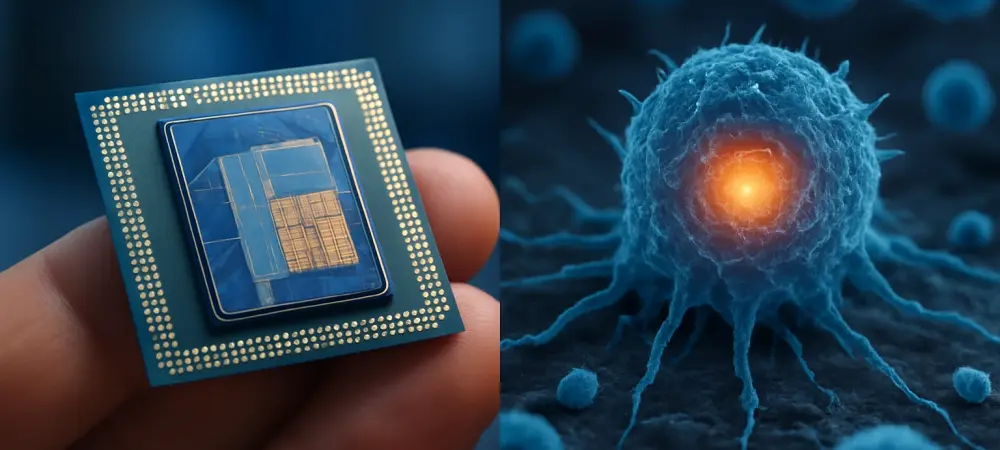In a world where technological innovation shapes the future of industries and individual lives, recent developments in semiconductor design and medical diagnostics stand out as game-changers, marking significant progress in their respective fields. Intel has captured attention with the upcoming reveal of its Panther Lake laptop chip, a pioneering advancement built on the company’s cutting-edge 18A process. Simultaneously, a remarkable stride in healthcare technology emerges as Owlstone Medical secures significant funding to revolutionize cancer detection through non-invasive methods. These breakthroughs signify a broader trend of harnessing technology to address critical challenges, from energy efficiency in computing to life-saving early diagnosis in medicine. As industries evolve at a rapid pace, such advancements highlight the profound impact of innovation on everyday life, promising enhanced performance in devices and improved health outcomes for millions. The convergence of these fields underscores a shared goal: leveraging technology to build a more efficient and healthier world.
Advancements in Semiconductor Technology
Intel’s latest endeavor with the Panther Lake laptop chip marks a pivotal moment for the semiconductor industry. Unveiled during exclusive briefings and factory tours in Arizona, this chip represents a significant leap forward as the first to be entirely constructed using Intel’s advanced 18A process. The company promises a remarkable 30% reduction in energy consumption, a critical factor in today’s eco-conscious market where sustainability drives consumer and corporate decisions. Additionally, Panther Lake offers up to a 50% improvement in data processing performance, setting a new benchmark for laptop capabilities. Slated for release in early 2026, this development positions Intel as a frontrunner in delivering high-performance, energy-efficient solutions, catering to the growing demand for powerful yet sustainable technology in both personal and professional spheres.
Beyond performance metrics, Panther Lake symbolizes Intel’s strategic push to overcome past manufacturing hurdles and restore confidence among investors and stakeholders. This chip is more than a product; it embodies a broader narrative of resilience and innovation within the tech giant. The focus on energy efficiency aligns with global efforts to reduce carbon footprints, while the enhanced processing power meets the needs of increasingly complex applications, from artificial intelligence to data analytics. By addressing these dual priorities, Intel aims to reclaim its competitive edge in a market dominated by rapid advancements and fierce rivalry. The anticipation surrounding Panther Lake reflects a collective hope for technology that not only performs exceptionally but also contributes to a more sustainable future, highlighting the intricate balance between progress and responsibility.
Revolutionizing Cancer Detection
In parallel with semiconductor strides, a transformative breakthrough in medical technology has emerged through Owlstone Medical, a Cambridge-based startup. The company recently secured a substantial $49.1 million grant from ARPA-H to fund the POSEIDON program, an ambitious initiative focused on developing at-home breath and urine tests for early cancer detection. Targeting over 30 types of cancer, this program leverages Owlstone’s innovative Breath Biopsy technology, which integrates synthetic sensors, biosensing, synthetic biology, and data fusion. The goal is to create non-invasive, low-cost screening methods that can be easily accessed by individuals, fundamentally changing how early diagnosis is approached and potentially saving countless lives through timely intervention.
The implications of Owlstone’s work extend far beyond the technology itself, reflecting a growing movement to democratize healthcare through accessible solutions. By focusing on at-home testing, the POSEIDON program addresses barriers such as cost and availability that often hinder early cancer detection, particularly in underserved communities. This initiative underscores the power of technology to bridge gaps in medical care, emphasizing prevention over treatment. The use of advanced data fusion to interpret results further ensures accuracy, offering hope for a future where routine screenings are as simple as a breath test. As this technology progresses, it could redefine public health strategies, prioritizing early intervention and reducing the burden of late-stage cancer diagnoses on healthcare systems worldwide.
Looking Ahead to Technological Impact
Reflecting on these milestones, the strides made by Intel and Owlstone Medical have captured significant attention in the tech and healthcare sectors. The unveiling of Panther Lake signaled a turning point for energy-efficient computing, while Owlstone’s funding achievement marked a hopeful step toward accessible cancer screening. Both developments highlight the relentless pursuit of innovation to solve pressing global challenges. As a next step, stakeholders in technology and healthcare might consider fostering collaborations that blend such advancements, potentially integrating high-performance chips into medical devices for even greater diagnostic precision. Additionally, policymakers could prioritize funding and regulatory support to accelerate the deployment of these technologies, ensuring they reach those who need them most. The journey of innovation continues, with the promise of a future where technology not only enhances performance but also profoundly improves quality of life across diverse fields.

